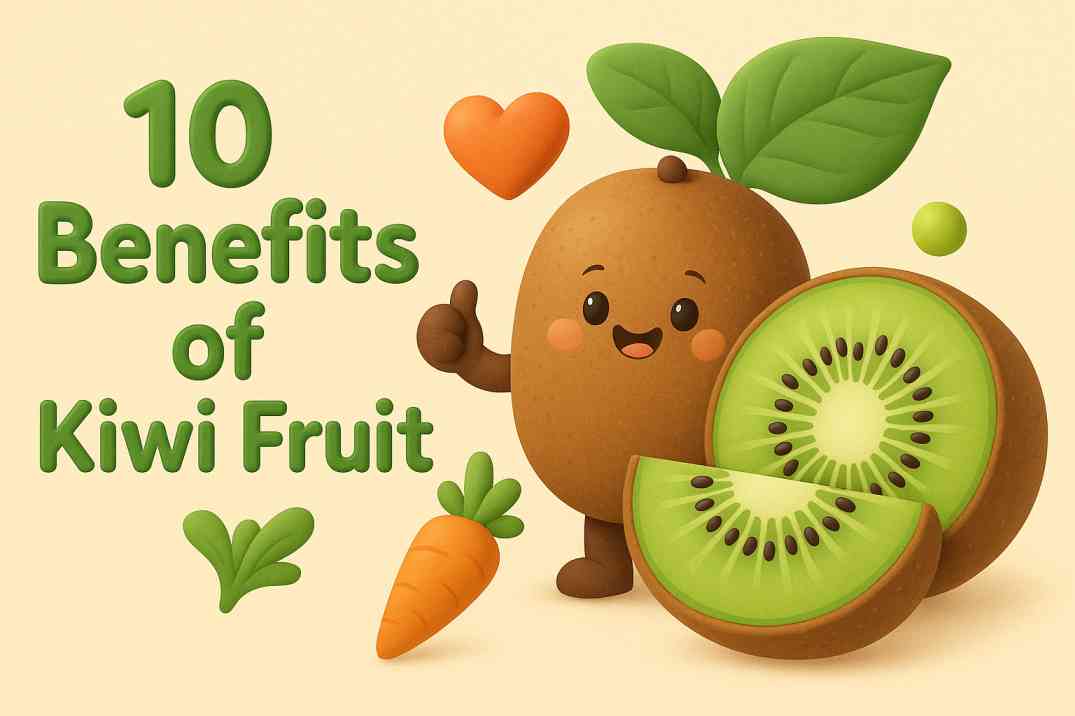10 Benefits of Kiwi Fruit, Its Uses and How It Supports Your Health

In today's health-conscious world, incorporating nutrient-rich fruits into daily diets is more important than ever. One such fruit that has earned a stellar reputation is kiwi. Known for its vibrant green color and tangy taste, kiwi is not just delicious but also a powerhouse of health benefits. This article explores the 10 Health Benefits of Kiwi, its practical uses, and how it plays a significant role in promoting overall well-being, including Kiwi benefits for female health and Kiwi benefits sexually.
The Nutritional and Health Attributes of Kiwifruit
Kiwifruit, often referred to simply as kiwi, is a nutrient-dense fruit packed with a remarkable profile of essential vitamins, minerals, and antioxidants. Among the many fruits available, few can match the nutritional and health attributes of kiwifruit in such a compact form. This vibrant green fruit is not only delicious but also a powerhouse of wellness-supporting elements.
Rich in Vitamin C and Antioxidants
Kiwifruit contains an exceptionally high concentration of Vitamin C—almost twice the amount found in oranges. This vitamin plays a crucial role in boosting the immune system, enhancing iron absorption, and combating oxidative stress. Moreover, kiwis are rich in polyphenols and carotenoids, which function as antioxidants that help neutralize harmful free radicals, thus potentially lowering the risk of chronic diseases.
Excellent Source of Dietary Fiber
One of the standout benefits of kiwi fruit is its fiber content. Just one medium kiwi provides about 2 grams of fiber. This aids in digestive health, prevents constipation, and supports a healthy gut microbiome. Additionally, dietary fiber contributes to satiety, which can help in weight management.
Supports Heart Health
Kiwifruit contributes positively to cardiovascular well-being. It is low in sodium and high in potassium, a mineral essential for maintaining normal blood pressure levels. Furthermore, the antioxidants and fiber work synergistically to lower LDL cholesterol, reduce platelet aggregation, and enhance overall heart function.
Contains Folate – Essential in Pregnancy
A notable benefit, especially for expecting mothers, is the folate content in kiwi. Kiwi Fruit Benefits in Pregnancy include aiding in fetal brain development and reducing the risk of neural tube defects. This makes kiwi an excellent dietary choice during preconception and prenatal phases.
Nutrient Profile Summary
-
Vitamin C – Enhances immunity and skin health
-
Vitamin K – Aids in blood clotting and bone metabolism
-
Vitamin E – Offers antioxidant protection
-
Potassium – Regulates blood pressure
-
Folate – Crucial for pregnant women
-
Magnesium & Calcium – Support nerve and muscle function
10 Health Benefits of Kiwi
1. Rich in Vitamin C: A Natural Immune Booster
One of the most notable benefits of kiwi fruit is its exceptional Vitamin C content. A single kiwi contains more Vitamin C than an orange, making it a superior option for enhancing immune function. Vitamin C plays a crucial role in stimulating the production of white blood cells, which defend the body against pathogens. Additionally, it acts as a powerful antioxidant that protects the body from free radicals and oxidative stress.
Regular consumption of kiwi helps reduce the duration and severity of common colds and infections. Moreover, it enhances the body's ability to absorb iron from plant-based sources, thus preventing iron-deficiency anemia. This is especially beneficial for individuals with restrictive diets or those in regions where iron-rich foods are less accessible. Due to its high Vitamin C concentration, kiwi not only contributes to a strong immune system but also supports wound healing, collagen formation, and maintenance of cartilage, bones, and teeth.
2. Supports Digestive Health: High in Fiber and Enzymes
Another significant aspect of the nutritional and health attributes of kiwifruit is its digestive benefits. Kiwi is rich in dietary fiber, which is essential for maintaining a healthy gut. The fiber content aids in regular bowel movements, preventing constipation, and supporting overall gut health.
Furthermore, kiwi contains a unique enzyme called actinidin, which helps in the breakdown of protein in the stomach, thereby facilitating easier digestion. This makes it particularly beneficial for individuals suffering from indigestion or bloating after high-protein meals. The combination of soluble and insoluble fiber ensures a balanced gut microbiota, enhances nutrient absorption, and prevents gastrointestinal disorders like irritable bowel syndrome (IBS).
Regular intake of kiwi, especially on an empty stomach, has been linked to improved bowel health and reduced incidence of acid reflux. Thus, adding kiwi to your diet can naturally support digestive efficiency and improve overall gastrointestinal function.
3. Heart Health: Lowering Blood Pressure and Cholesterol
One of the most critical kiwi benefits is its contribution to cardiovascular health. Kiwi is loaded with potassium, a mineral that counteracts sodium's effect in the body, thereby helping to regulate blood pressure. High blood pressure is a major risk factor for heart disease, and including kiwi in your diet can significantly help in keeping it in check.
In addition to potassium, kiwi is rich in antioxidants like polyphenols and Vitamin E, which combat oxidative stress—a major contributor to heart disease. Studies have shown that consuming two to three kiwis a day can reduce platelet aggregation and lower triglyceride levels in the blood. This not only reduces the risk of clot formation but also helps in maintaining clear and flexible arteries.
Moreover, kiwi's fiber content plays a role in lowering LDL (bad) cholesterol levels. The combined action of antioxidants, potassium, and fiber makes kiwi a heart-friendly fruit that supports overall cardiovascular wellness.
4. Improves Respiratory Function: Especially in Children
Kiwi has been found to be particularly effective in improving respiratory health, especially in children. Its high Vitamin C and antioxidant content reduce inflammation and oxidative stress in the lungs. A study published in the journal Thorax indicated that children who regularly consumed kiwi experienced a lower incidence of respiratory symptoms such as wheezing, shortness of breath, and night coughing.
The anti-inflammatory compounds in kiwi can help alleviate symptoms of asthma and other chronic respiratory conditions. This makes kiwi an excellent dietary choice for individuals susceptible to seasonal allergies or asthma.
In adults, kiwi can support respiratory health by enhancing the body's immune response and reducing the severity of upper respiratory tract infections. Regular consumption of this fruit can therefore be a simple and natural way to improve lung function and reduce respiratory distress.
5. Regulates Blood Sugar Levels: A Low Glycemic Index Fruit
Despite its naturally sweet taste, kiwi has a low glycemic index (GI), making it a safe and beneficial fruit for people with diabetes or those looking to manage blood sugar levels. The fiber in kiwi slows the digestion and absorption of carbohydrates, leading to a gradual rise in blood glucose rather than a sudden spike.
Moreover, kiwi is low in calories and carbohydrates, further supporting blood sugar control. Research has shown that the polyphenols and antioxidants in kiwi can improve insulin sensitivity and help manage glucose metabolism.
For those monitoring their sugar intake, kiwi is a guilt-free and nutrient-dense option that provides sweetness without the blood sugar roller coaster. This makes it an ideal fruit for diabetic meal plans and weight management diets alike.
6. Aids in Weight Management: Low-Calorie and Satiating
Kiwi benefits extend into the realm of weight management. This fruit is low in calories but high in water and fiber content, which helps in creating a feeling of fullness and reducing overall calorie intake.
The presence of both soluble and insoluble fiber aids in digestive health and prolongs satiety. Eating kiwi as a snack or before meals can help curb appetite and reduce binge eating tendencies. Additionally, the actinidin enzyme enhances protein digestion, making your meals more efficient in nutrient absorption.
As a natural and healthy snack option, kiwi supports fat metabolism, reduces bloating, and keeps energy levels stable throughout the day—making it an excellent choice for anyone aiming to lose or maintain weight.
7. Boosts Eye Health: Lutein and Zeaxanthin
Kiwis are rich in eye-protecting antioxidants such as lutein and zeaxanthin. These compounds are essential for maintaining eye health, especially as we age. They help filter harmful blue light and protect the eyes from oxidative damage, which can lead to age-related macular degeneration (AMD).
The Vitamin C and E in kiwi also support the health of ocular blood vessels, reducing the risk of cataracts and other vision-related issues. Including kiwi in your diet can thus contribute to long-term eye health and help maintain sharp vision into older age.
8. Enhances Skin Health: Anti-Aging and Hydration Benefits
The high antioxidant content in kiwi makes it a potent ally for skin health. Vitamins C and E promote collagen synthesis, which is crucial for maintaining skin elasticity, reducing fine lines, and preventing premature aging.
Kiwi also has a high water content, which helps hydrate the skin from within. Its anti-inflammatory properties soothe the skin and reduce conditions like acne and irritation. When applied topically or consumed regularly, kiwi enhances skin tone, texture, and overall appearance.
For individuals focused on skincare, the kiwi benefits for female populations are especially relevant. Hormonal changes can affect skin health, and kiwi offers a natural solution to balance these effects.
9. Supports Pregnancy: Folate and Nutrient-Dense
One of the most important Kiwi Fruit Benefits in Pregnancy is its folate content. Folate is a vital B-vitamin necessary for fetal neural development and the prevention of birth defects such as spina bifida.
Kiwi also provides a range of essential nutrients—iron, calcium, magnesium, and Vitamin K—all crucial during pregnancy. Its high fiber content prevents constipation, a common issue during pregnancy, while its antioxidants help strengthen the immune system.
For expectant mothers, incorporating kiwi into their daily diet ensures better nutrient absorption and supports the health of both mother and baby.
10. Enhances Sexual Health: Natural Libido Booster
Kiwi benefits sexually include improved blood circulation and hormonal balance, both of which are critical for sexual wellness. The presence of zinc, Vitamin E, and arginine supports reproductive health by increasing libido and enhancing sexual performance.
Improved cardiovascular health from regular kiwi consumption also ensures better blood flow, which is crucial for sexual arousal and function. For both men and women, kiwi offers a natural way to enhance intimacy, energy, and mood.
Incorporating kiwi into the daily diet can thus play a supportive role in maintaining a healthy and satisfying sexual life.
Kiwi in Your Daily Diet – Simple Uses
Incorporating kiwifruit into your daily diet is a flavorful and nutritious way to boost overall health. Known for its vibrant green color and tangy-sweet taste, kiwi is not only delicious but also versatile in various meals and snacks. The nutritional and health attributes of kiwifruit make it an excellent addition to a balanced diet.
1. Morning Boost with Smoothies or Juices
Start your day with a kiwi smoothie. Blend kiwi with banana, spinach, Greek yogurt, and a splash of orange juice for a nutrient-packed drink. This energizing blend supports digestion, immunity, and skin health, aligning with the 10 Health Benefits of Kiwi.
2. Add to Breakfast Bowls or Cereal
Slice kiwi and add it to oatmeal, granola, or chia pudding. It adds a refreshing taste and a boost of fiber, vitamin C, and antioxidants. This is especially beneficial for women looking to harness kiwi benefits for female wellness.
3. Midday Salads and Salsas
Kiwi complements both fruit and green salads. Combine it with avocado, tomatoes, and red onions for a unique salsa or add slices to a spinach salad. This supports heart health and enhances nutrient absorption.
4. Healthy Desserts and Snacks
Top Greek yogurt with kiwi, nuts, and honey for a wholesome dessert. Kiwi can also be frozen into popsicles or added to fruit skewers, providing a sweet yet healthy option for all ages.
5. Support During Pregnancy
Pregnant women can benefit from kiwi’s folate, fiber, and immune-supporting nutrients. Including it in meals helps ensure better digestion and fetal development—highlighting Kiwi Fruit Benefits in Pregnancy.
Scientific Support for Kiwi Benefits
Numerous studies published in journals such as the Journal of Nutritional Biochemistry support the immune-boosting, antioxidant, and anti-inflammatory properties of kiwi.
Read research on Kiwi Health Benefits
Why Kiwi Deserves a Place in Your Diet
To recap, the Benefits of kiwi fruit range from improving immunity and digestion to enhancing heart and sexual health. Its rich nutrient profile supports multiple bodily systems, making it an ideal addition to your wellness routine. Whether you’re seeking Kiwi benefits for female health, pregnancy support, or overall vitality, kiwi offers natural solutions backed by science.
Final Thoughts
Incorporating kiwi into your daily diet can yield long-term health benefits. From boosting immunity to supporting reproductive health, this fruit is a nutritional gem. Don’t wait—add this superfruit to your grocery list and experience the 10 Health Benefits of Kiwi firsthand.
Ready to transform your health naturally? Start your wellness journey today by adding kiwi to your daily routine. Share this blog with friends and family to spread the power of nature’s green treasure.
You May Also Like

Comprehensive Pain Management Solutions in Rockwall TX: Chronic Pain Care & Specialists

Buy Telegram Members for Crypto Groups in 2025: Real Growth, SEO & Business Success

10 Reasons Why Your Facebook Post is Not Getting Likes & How to Fix It in 2025

Best Famous Astrologer Online in India – Astrologer@Home

Read Your Future with AI: How AI Astrology Chatbots and Online Astrologers Are Reshaping Personalized Readings

